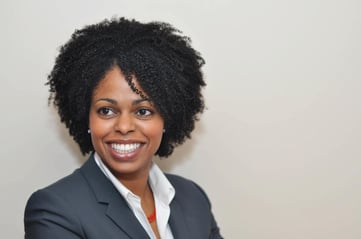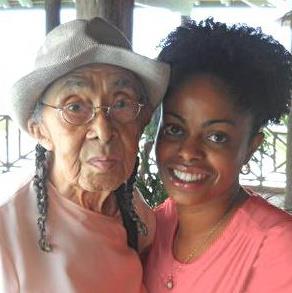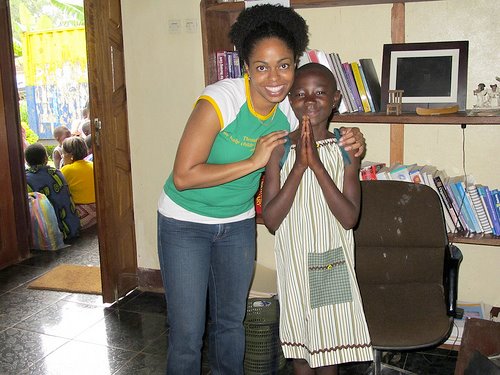Practical Activist Q&A featuring Monique Aiken, The Investment Integration Project
- Bluestone Staff
- March 31, 2022
Feature image above: Monique is co-founder of Make Justice Normal. Image below: Monique in professional mode.
 Monique Aiken is Managing Director of The Investment Integration Project (TIIP), a consulting services and applied research firm that provides advice, thought leadership and a turnkey solution to help investors manage systemic risks and opportunities. She has been the host of ‘The Reconstruction,’ a podcast series hosted at ImpactAlpha, where she is also a Contributing Editor. Monique is co-founder of Make Justice Normal, a growing collective seeking to open space for people working to move capital towards justice, and the ReStarter Fund, an economic and climate justice initiative aiming to address systemic problems and structural barriers faced by small businesses in a post-Covid, Net Zero aspiring world.
Monique Aiken is Managing Director of The Investment Integration Project (TIIP), a consulting services and applied research firm that provides advice, thought leadership and a turnkey solution to help investors manage systemic risks and opportunities. She has been the host of ‘The Reconstruction,’ a podcast series hosted at ImpactAlpha, where she is also a Contributing Editor. Monique is co-founder of Make Justice Normal, a growing collective seeking to open space for people working to move capital towards justice, and the ReStarter Fund, an economic and climate justice initiative aiming to address systemic problems and structural barriers faced by small businesses in a post-Covid, Net Zero aspiring world.
Monique serves on the Investment Committee for the NYU Impact Investment Fund and the Steering Committee for the Intentional Endowments Network. She is a member of the Fast Company Executive Board, an invitation-only professional organization of company founders, executives, and leaders who are defining the future of business. Monique also serves on the Board of the Institute for Nonprofit Practice, whose mission is to transform communities by equipping the most promising nonprofit leaders with the skills, confidence, and resources they need to make their organizations effective, innovative, and sustainable; and the Advisory Boards for Pivotal Advisors, the first Black/Afro-Latina led OCIO; and Imperia Global, a global innovation & leadership development organization for women changing the world.
Here are some highlights of our recent conversation with her:
Q: Was there a specific experience (or moment) that ignited your passion for social change and impact investing?
Photo right: Monique and "Mama"
 A: I think there are so many people in impact investing that got here through different life experiences because it’s such an interdisciplinary space. You’ll find people from policy, finance, engineering and all kinds of other verticals that have made their way into this nexus. There wasn’t a pivotal moment for me. My path was really revealed over time…the path was made by walking it. I’m a first generation American and my parents were both born in Jamaica. Because of this, I’ve always had more of a world view than your average American who grew up in Central Jersey. When I look at my family values about community service and giving back, it really goes back to my late grandmother who everyone called “Mama”. She had eight kids and became a widow when my Dad was 10. Despite that, she took in around 20 other children over the course of her life. She took responsibility for the people around her. She lived the creed: “If you learn about a problem, it’s your responsibility to do something about it.” So, this idea of an expanded definition of responsibility is what informs my work in impact investing.
A: I think there are so many people in impact investing that got here through different life experiences because it’s such an interdisciplinary space. You’ll find people from policy, finance, engineering and all kinds of other verticals that have made their way into this nexus. There wasn’t a pivotal moment for me. My path was really revealed over time…the path was made by walking it. I’m a first generation American and my parents were both born in Jamaica. Because of this, I’ve always had more of a world view than your average American who grew up in Central Jersey. When I look at my family values about community service and giving back, it really goes back to my late grandmother who everyone called “Mama”. She had eight kids and became a widow when my Dad was 10. Despite that, she took in around 20 other children over the course of her life. She took responsibility for the people around her. She lived the creed: “If you learn about a problem, it’s your responsibility to do something about it.” So, this idea of an expanded definition of responsibility is what informs my work in impact investing.
I studied international politics at Georgetown and I thought that I would join the Foreign Service. Through a program called SEO, whose mission is to create a more equitable society by closing the academic and career opportunity gaps for motivated young people from underserved and/or historically excluded communities, I had the opportunity to take an internship in finance, which changed the trajectory of my life. I was drawn to finance to fill a gap in knowledge about how the world worked and it ended up becoming my unexpected career. Nearly 15 years later, I went to work at the Clinton Global Initiative which really introduced me to all the thematic areas that are part of impact investing.
To me, impact investing is about taking responsibility for what others may call “externalities” and being intentional to find solutions and create positive outcomes for more people and the planet, centering racial and gender justice in that thinking.
In this random walk, which got me to a place where systems change meets justice, I discovered my life purpose. It makes sense looking backwards now, but way back when I started studying at Georgetown or even when I was going to business school in the early 2000s, the term “impact investing” wasn’t even coined yet.
Q: When you look at the spectrum of impact investing today, where do you see it going in the future?
A: Thinking about system level change and outcomes is where the conversation needs to be. Right now, we have a choice: are we going to choose extinction or do better? If we don’t reorient our thinking around the systems change needed to allow more people to thrive and limit or reverse the effects of climate change, it will all be a moot point. How are we going to respond to the urgency at scale? The impact investing world has tested and proven many models that we built for such a time as this. When you think about the latest IPCC report and the invasion of Ukraine, not to mention so many other places around the world suffering – Afghanistan, Palestine, Yemen, Somalia, the DRC and the associated refugee crises– we see that these crises affect everyone and disproportionately make women and girls more vulnerable. You can’t diversify your portfolio out of this. And, not to mention other pre-existing systemic risks, like racism, the patriarchy, and income inequality. It’s dangerous and harmful to ignore.
Greater inclusiveness could be like a global annuity lifting everyone up around the world. I’m hopeful that we take the medicine now and realize that we can act faster than we have in the past…the pandemic showed us that we can.
Q: What advice would you give investors (both individual and institutional) who are interested in learning more about sustainable investment strategies?
A: The best learning comes by doing and asking questions. So, I would say to anyone starting to move money toward positive systems change and justice: if you have an advisor talk to them about it, if you don’t, think about your current holdings; if you don’t have any investments yet, perhaps you are lucky enough to have a retirement account or life insurance. You can ask about how those things are invested on your behalf. It’s okay to start small if that’s where you are most comfortable.
The important thing is to be on the journey. It’s also important to remember that you spend dollars every day… so whether you have $10 in your pocket or tens of millions, you can do something. How you spend as a consumer, that’s your own capital that you are stewarding. So, support companies that are aligned with your values around climate or building sustainable supply chains or companies who are paying people a living wage.
Educate yourself about that, and see whether there is modern slavery embedded in their supply chains. You wouldn’t want to be inadvertently supporting that, right? I know I wouldn’t. While this information isn't always easy to find, there are field builders out there trying to increase transparency so that consumers can make informed decisions. How we all spend money ultimately connects back to investments and which companies are being invested in. If you happen to have authority over large pools of capital as an investment professional, you can align those dollars for positive systems change. We need to get as much money moving in the right places as possible, so look for your way in. If you’re someone who likes to dig in and read at a more academic level, I’d recommend Moving Beyond Modern Portfolio Theory or 21st Century Investing: Redirecting Financial Strategies to Drive Systems Change, which describes how institutions and individuals can go beyond conventional and sustainable investing to address complex problems such as income inequality and climate change on a deep, systemic level or as we call it “system-level investing.”
Q: You’ve had the opportunity to look at financial systems from the investment banking lens and from the perspective of foundations. What stands out the most to you when you reflect on what you’ve learned?
A: Motivation and incentives matter and the structure of your organization informs how you show up in the world. What is your theory for how change happens and your role in it? What are the incentives for behavior? To design solutions that fit, we have to really get to the core of what the barriers to the action are and outcomes needed. If the rules that govern us don’t allow us to do the right thing, the ethical thing, the just thing...then we must figure out how to change the rules.
Q: Do you have a mantra or quote that you live by or that inspires you?Image right: Monique volunteering in Cameroon for 200 Orphanages.You never know what you're training for.
 A: My mantra is: “You never know what you’re training for.” I didn’t know that I was training to do work in systems change. Last fall, I co-founded an organization called Make Justice Normal. I didn’t realize when we named it that I was basically discovering my purpose. Earlier in my journey, I knew what it was not. I knew a purpose could not be to help companies manage the volatility in their income statements, which was the job in Commodity Derivatives. But, it’s all learning, it’s all part of the journey to where I am, which makes it all make sense now, that I’m here thinking about justice-centered systems change. Trying to make justice normal is a purpose. I am also inspired by the idea of being an ancestor and what that means. That animates me. This framing came to me from a book called Emergent Strategy by Adrienne Maree Brown. It really gets to the heart of who the world is designed for and what we need to rethink as we design a future that is intersectional and inclusive. A future that reduces climate risk, not worsens it. We can raise the ceiling and raise the floor at the same time, designing a world where the historically excluded thrive. Were we training for multiple intersecting crises? Maybe not, but now they’re here. Let’s collectively activate to make positive justice centered systems change together so that we allow more people and the planet to thrive. Let’s not choose extinction.
A: My mantra is: “You never know what you’re training for.” I didn’t know that I was training to do work in systems change. Last fall, I co-founded an organization called Make Justice Normal. I didn’t realize when we named it that I was basically discovering my purpose. Earlier in my journey, I knew what it was not. I knew a purpose could not be to help companies manage the volatility in their income statements, which was the job in Commodity Derivatives. But, it’s all learning, it’s all part of the journey to where I am, which makes it all make sense now, that I’m here thinking about justice-centered systems change. Trying to make justice normal is a purpose. I am also inspired by the idea of being an ancestor and what that means. That animates me. This framing came to me from a book called Emergent Strategy by Adrienne Maree Brown. It really gets to the heart of who the world is designed for and what we need to rethink as we design a future that is intersectional and inclusive. A future that reduces climate risk, not worsens it. We can raise the ceiling and raise the floor at the same time, designing a world where the historically excluded thrive. Were we training for multiple intersecting crises? Maybe not, but now they’re here. Let’s collectively activate to make positive justice centered systems change together so that we allow more people and the planet to thrive. Let’s not choose extinction.
The Practical Activist blog is created by Bluestone Life. With Bluestone, your life insurance creates positive impact for family, community and planet. A Certified B Corp and a member of 1% for the Planet, Bluestone is a transformative choice for social, environmental and financial systems change.
Like hearing about Practical Activists?
We’ll share their stories with you monthly. (No email overload… we promise!)


